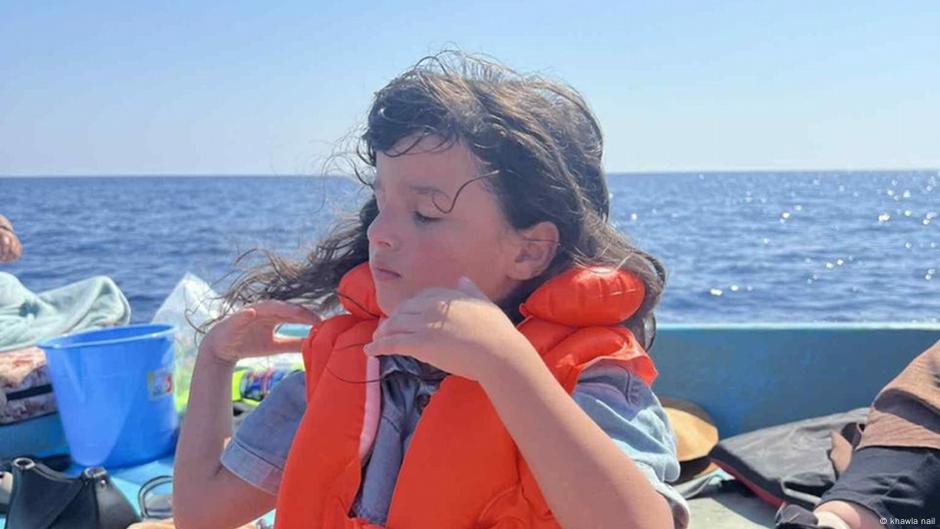In recent weeks, the harrowing story of a 7-year-old girl named Sohan Aboulsoud has come to symbolize the ongoing healthcare crisis in Libya. Suffering from cystic fibrosis—a life-threatening genetic disorder that affects the lungs, digestive system, and other organs—Sohan’s family was forced to make an agonizing decision: flee their homeland in search of medical treatment unavailable within its borders.
On June 25, Sohan, her mother Khawla Nail, and her stepfather embarked on a dangerous journey across the Mediterranean Sea aboard an overcrowded smuggling boat. The image of a visibly exhausted Sohan, captured by her mother and shared online, quickly went viral, drawing international attention to the plight of Libyan families struggling to access basic healthcare services.
The emotional photograph sparked protests in Tripoli, where dozens of families with children suffering from cystic fibrosis gathered to demand government action. They called for increased availability of essential medications and the establishment of diagnostic centers capable of treating rare diseases like cystic fibrosis. Without these resources, they warned, lives remain at risk.
Political Instability and Healthcare Collapse
Since the fall of Muammar Gaddafi in 2011, Libya has been mired in political turmoil. Since 2014, the country has been effectively divided between two rival governments: the UN-backed Government of National Unity (GNU) based in Tripoli in the west, and the House of Representatives located in Tobruk in the east. Repeated attempts to unify the country under a single administration have failed, leaving Libya fragmented and governance inconsistent.
This prolonged instability has had devastating consequences for public infrastructure, particularly the healthcare sector. A 2021 report by the World Health Organization revealed that approximately one-third of health facilities in southern and eastern Libya were nonfunctional, while the majority of others operated at reduced capacity. Advanced hospitals are scarce, and vital medicines are often unavailable or prohibitively expensive.
For years, Sohan’s family tried every possible avenue within Libya to secure proper care for her condition. Private lab tests were sent to Tunisia, and medication was purchased through private pharmacies—an unsustainable financial burden for most families. Despite submitting numerous requests to the Libyan health authorities, Sohan’s mother was repeatedly told there was no budget available to support such treatments.
According to leaked documents, more than 60 Libyan families have formally petitioned the Ministry of Health for assistance with cystic fibrosis treatment. Each request included personal identification details, underscoring the desperation of those affected.
Mahmoud Abu Dabbous, head of the National Organization for Organ Donation Support in Libya, emphasized that Sohan’s case is not unique. He described the family’s perilous journey to Europe as a “grave indicator” of Libya’s inability to provide even basic healthcare services to its citizens.
Migration as a Last Resort
Tens of thousands of migrants have attempted the treacherous crossing from Libya and Tunisia to Europe over the past decade. According to the International Organization for Migration’s Missing Migrants Project, more than 63,000 people have died or gone missing since 2014 attempting this route. Experts believe the actual number is much higher due to gaps in data collection.
Upon arriving at Italy’s Lampedusa Island, Sohan and her family were placed in a temporary shelter without air conditioning—a dangerous environment for someone with cystic fibrosis, which can be exacerbated by heat and dehydration. Her mother expressed concern that even minor lapses in hydration could send her daughter into intensive care.
Despite the GNU’s public pledge to cover Sohan’s medical expenses in Italy, the family reported receiving only one brief communication from officials before all contact ceased. Attempts to reach the Libyan Ministry of Health for clarification yielded no response.
Human rights advocate Tarik Lamloum, head of the Libyan organization Beladi, lamented that government responses in such cases rarely extend beyond initial political statements. He warned that Sohan’s story might encourage other desperate families to attempt similar journeys, rather than prompting systemic change within Libya.
Instead of glorifying the necessity of fleeing for treatment, Lamloum argued, the state should focus on addressing the root causes of the healthcare crisis and ensuring that patients receive the care they need within their own country.







